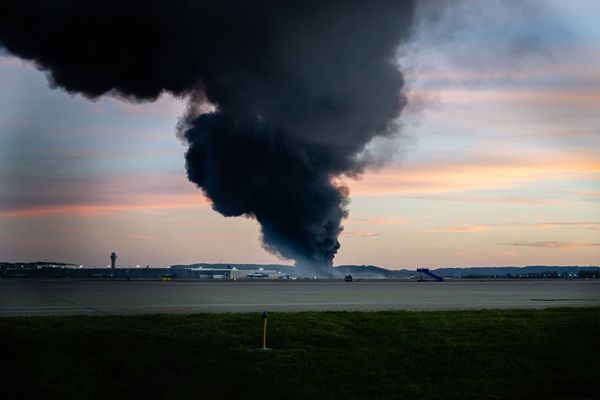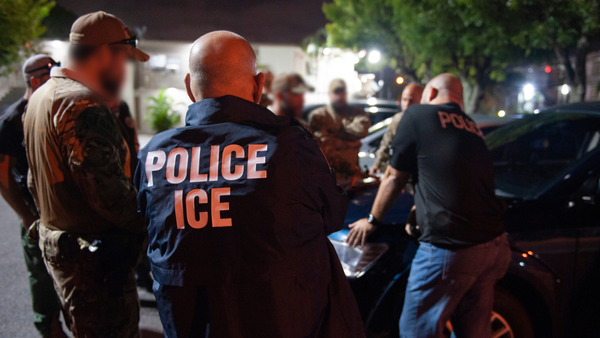KYIV, Ukraine — An around-the-clock curfew brought the capital to a standstill and Russian forces stepped up their attacks on civilian areas across Ukraine on Wednesday even as both Moscow and Kyiv reported progress on negotiations to halt a war that has caused a growing humanitarian and refugee crisis.
At the same time, Ukrainian President Volodymyr Zelenskyy kept up his string of appeals to lawmakers around the world with a desperate plea for assistance to the U.S. Congress and President Joe Biden. He requested more military aid and heavier sanctions on Russia and repeated his request for a no-fly zone over his battered country.
“I need your help,” Zelenskyy said by video hours after more deaths, injuries and damage were reported in Kyiv, Kharkiv and other Ukrainian cities on the the 21st day of a war that has sent more than 3 million people fleeing the country.
Plumes of smoke rose Wednesday from a 12-story apartment building in Kyiv’s Shevchenkivskyi district, just a few miles northwest of the city center, after Russian shelling left at least two people injured in a predawn attack. Several floors became engulfed in flames and the top floor was destroyed.
In the northeastern city of Kharkiv, Ukraine’s second largest, two people were found dead and four were injured after artillery destroyed two residential buildings, Ukrainian officials said. Part of a school building was also damaged early Wednesday.
In Chernihiv, about 90 miles northeast of the capital, 10 people were shot and killed while standing in line for bread, the U.S. Embassy in Kyiv said on Twitter.
The assaults took place as a third day of negotiations was set to begin between Ukraine and Russia, the latest attempt to broker peace after the two sides failed to reach agreement during multiple rounds of previous talks.
In an early morning video, Zelenskyy said that the demands of both nations were sounding “more realistic.” But he said that “time is still needed for the decisions to be in the interests of Ukraine.”
In Moscow, Russian Foreign Minister Sergey Lavrov agreed that a “businesslike spirit” had begun to mark the talks. He told Russian channel RBK TV that “a neutral status [for Ukraine] is being seriously discussed in connection with security guarantees,” but there was no confirmation of that from Kyiv.
Zelenskyy, who met Tuesday with leaders of three European Union and North Atlantic Treaty Organization states — Poland, Slovenia and the Czech Republic — and spoke the same day to the Canadian Parliament in a video address, took his case directly to U.S. lawmakers on Wednesday.
Speaking to a joint session of Congress, he asked the Biden administration to ramp up its efforts to help Ukraine by supporting a no-fly zone over the nation, sending fighter jets and sanctioning more Russians.
Kyiv “doesn’t give up. And we have not even thought about it for a second, just like many other cities and communities in our beautiful country which found themselves in the worst war since World War II,” Zelenskyy said in Ukrainian.
Citing the attacks on Americans at Pearl Harbor in 1941 and at the World Trade Center and Pentagon in 2001 — both of which led the U.S. into wars — he asked Washington to take a more hands-on approach to defending Ukraine.
“Being the leader of the world means to be the leader of peace,” Zelenskyy said in English as he directly addressed Biden. “Peace in your country doesn’t depend any more only on you and your people. It depends on those next to you and those who are strong. Strong doesn’t mean weak. Strong is brave and ready to fight for the life of [your] citizens and citizens of the world, for human rights, for freedom, for the right to live decently and to die when your time comes and not when it’s wanted by someone else, by your neighbor.”
Congress recently approved $13.6 billion in emergency military and humanitarian aid for the embattled nation and is expected to send even more.
But the Biden administration has been steadfast in refusing to support a NATO-enforced no-fly zone over Ukraine because of the risk of direct military confrontation with Russia. It has also resisted Zelenskyy’s calls to transfer Polish MiG fighter jets to Ukraine via a U.S. military base in Germany.
It’s unclear how much the outpouring of U.S. assistance will help the country, which has impressed the world by fending off a bigger, more militarily advanced enemy but also suffered hundreds of deaths and severe losses of territory, especially in the east and in the southern port city of Mariupol, where aid convoys have been blocked in recent days.
While he tries to rally more international support, Zelenskyy appeared to shift on the key issue of NATO membership for Ukraine, pursuit of which is enshrined in the country’s constitution. On Tuesday, he said he accepted that his nation would not join the transatlantic alliance.
“It is clear that Ukraine is not a member of NATO — we understand this,” Zelenskyy said in a speech to the Joint Expeditionary Force, a British-led group of 10 North Atlantic countries on rapid crisis response. “For years we heard about the apparently open door, but have already also heard that we will not enter there, and these are truths and must be acknowledged.”
Russian President Vladimir Putin has demanded that Ukraine never join the alliance and cited Kyiv’s desire to do so as a sign of Western aggression toward Russia.
On Wednesday, British Prime Minister Boris Johnson said he agreed with Zelenskyy. There’s “no way Ukraine is going to join NATO anytime soon,” Johnson said during a visit to Abu Dhabi, in the United Arab Emirates.
Mykhailo Podolyak, an adviser to Zelenskyy who is part of negotiations, tweeted Wednesday that “our position at the negotiations is quite specific,” saying Ukraine needed “legally verified security guarantees; cease-fire; withdrawal of Russian troops.”
He also suggested that Russians were more likely to negotiate because of Ukrainian counteroffensives. In a “PBS NewsHour” interview, Podolyak said Russia was making “adjustments” to its demands because “they see the war is not going according to their plans.”
“They were planning to move in their troops, capture as much territory as possible in three days and basically have a blitzkrieg,” he said in the interview. “They did not do that and they will not do that. They are stuck fighting in their current positions. ... Therefore, we have much confidence that we will have a cease-fire in coming days.”
In Kyiv, residents said it felt like the danger was getting closer even though Russian troops haven’t made deep inroads into the city, and routes in and out of it remained open.
Maria Zhartovska, a 31-year-old local journalist who works for the news website Babel.ua, said she awoke “to the sounds of explosions” for the second day in a row. She lives near the Lukyanivska subway station, which is three miles from Zelenskyy’s office and was shut down after Russian shelling damaged it Tuesday.
“By morning, we heard the air-raid sirens five times,” Zhartovska said.
As afternoon came, a series of loud explosions rumbled through the city center, where the occasional car still drove on streets completely devoid of pedestrians.
The city’s curfew, imposed Tuesday evening because of what Mayor Vitali Klitschko described as a “dangerous moment” in the capital, is scheduled to end Thursday.







